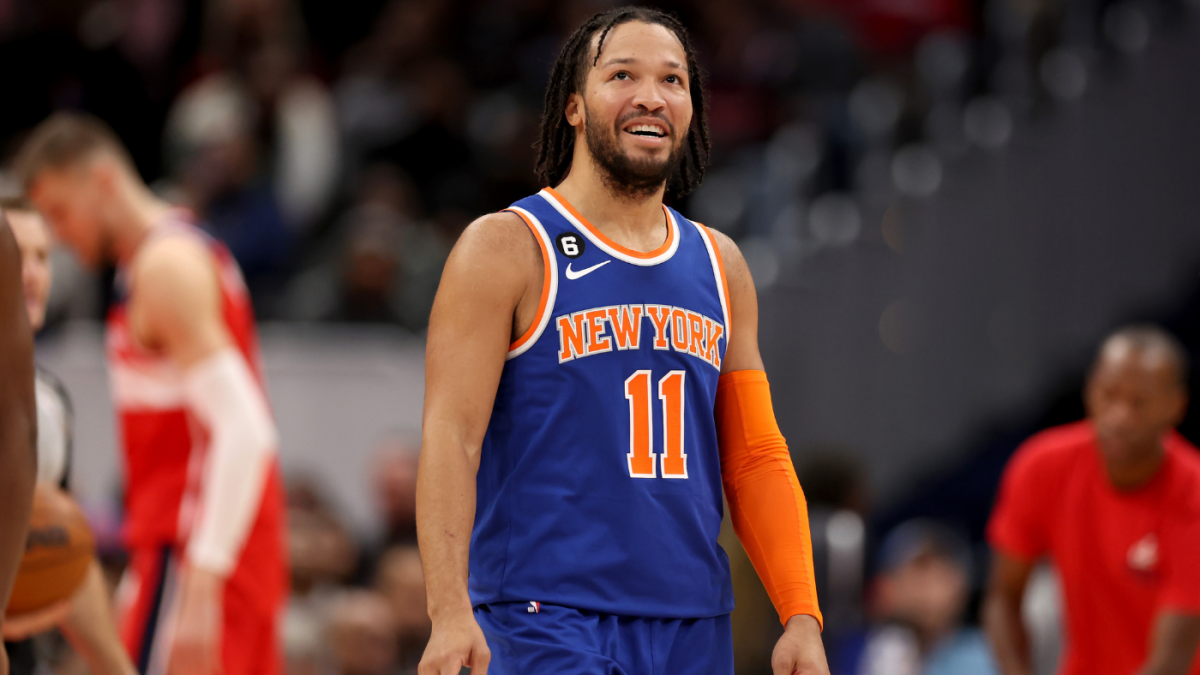After the NBA announced its All-Star Game starting and reserve lineups, fanbases across the league are up in arms surrounding the selection criteria, and rightfully so.
The standout snub from the starting lineups was Jalen Brunson. The 6-foot-two guard from the Knicks has emerged as a star this season, leading them to their best record since the 2012-13 season with a record of 32-18 through 50 games. His contribution to the team comes in the form of 27.1 points, 3.9 rebounds and 6.4 assists per game, all while shooting 48.1% from the field.
Despite these numbers, Brunson would miss out on a starting spot in the Eastern Conference to Milwaukee Bucks guard Damian Lillard. Lillard’s numbers on the season so far sit at 25.1 points, 4.3 rebounds and 6.8 assists per game, while shooting 42.2% from the field.
There is only one position that separates the two players’ teams in the Eastern Conference, with the Knicks currently in third and the Bucks in second.
On the Bucks, Lillard is partnered with arguably the best player in the league, Giannis Antetokounmpo. Despite being on the better team on paper, Lillard has still put up worse numbers than Brunson, so why was Lillard chosen to be a starter over Brunson? The answer is fan voting.
Fan vote controversy is nothing new for the NBA. It was introduced in the 1974-75 season, allowing fans across the league the opportunity to vote for who they think should be All-Stars, with the seven reserves selected by each conference’s respective head coaches.
This system would eventually change 42 years later, during the 2016-17 season the NBA announced it would allow the players and media to get a say. A new voting system was implemented, giving the fan vote 50% of the weight, with the media and player votes each counting for 25%.
“Once votes are tallied, players are ranked in each conference by position (guard and frontcourt) within each of the three voting groups. Each player’s score is calculated by averaging his weighted rank from the fans, players and media. The two guards and three frontcourt players with the best score in each conference are named starters. Fan votes serve as the tiebreaker for players in a position group with the same score,” per the NBA.
According to the NBA’s voting tally this year, Brunson finished second in the media rankings and third in voting among current players. In comparison, Lillard finished fifth among the media and fourth in player voting. The difference maker between the two is seen in Lillard’s third overall placement in fan voting to Brunson’s fifth.
After all was said and done, the pair sat at a weighted score of 3.75 each. However, given Lillard’s advantage in fan voting, he would win the tiebreaker and, ultimately, the starting spot.
Many fixtures in NBA media would be quick to call out this decision, citing Brunson’s impact on the league as a whole.
“I would have loved to see Jalen Brunson as a starter… he made the Knicks relevant for the first time since Patrick Ewing,” said NBA Hall of Famer Charles Barkley when discussing the issue on “NBA Tip-Off.”
Others felt that Brunson was not as deserving.“Jalen Brunson is a star and deserves all the credit in the world – but I’m sorry… Haliburton and Donovan Mitchell, 28 a game… I’m supposed to ignore that,” said Stephen A. Smith on ESPN’s “NBA Today.”
His co-host and former player Kendrick Perkins was quick to call out Smith and the Knicks organization.
“I voted for Haliburton and Brunson… you are a prime example, along with the [Knicks] organization, of not promoting this man,” said Perkins on “NBA Today.”
With the fan vote having a 50% weight with respect to team selection, promoting players in the media has become a large aspect of All-Star Weekend. Lillard has swept the nation with his “Dame Time” clutchness and his coverage as a key member of one of the best teams in the league. For Brunson, it has been another story.
Las Vegas Aces head coach Becky Hammon sparked controversy when she deemed Brunson too small to lead a team.
“You gotta have a 1A dude, and they’re missing that at the end of the day,” said Hammon when discussing Brunson’s abilities on “NBA Today.”
Even when met with criticism, she doubled down on her comments.
“He’s an All-Star and will be an All-NBA performer, but I stand by my statement that I can’t put him in a Lebron, Steph, Embiid, type of 1A tier player, and that if your best player is the smallest player on the court, you (probably) won’t win a CHAMPIONSHIP,” wrote Hammon in a Twitter post in reaction to criticism.
These comments in the media can hold a large weight among fans at the end of the day, impacting their opinions and, subsequently, their voting.
It begs the question, should the NBA be providing more weight to the voting people who 1) don’t play the game professionally, or 2) don’t watch and discuss the game professionally?
Perhaps the most reasonable solution is to lower the percentage of weight that the fan vote holds; or maybe it’s as simple as changing the tiebreaker from fan vote to player vote.
In either of these scenarios, Brunson would be on the court when the All-Star game tips off in Indianapolis on Feb. 18.
Brunson was named to the All-Star reserve team along with his teammate, Knicks forward Julius Randle.






































































































































































































